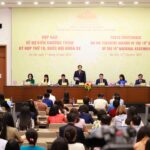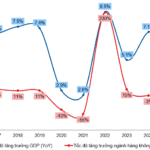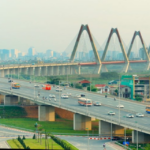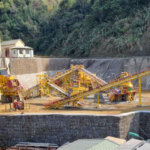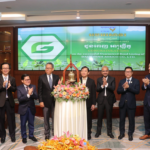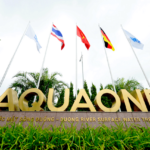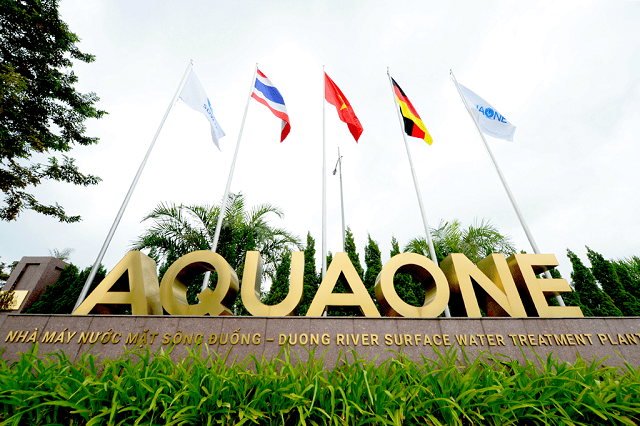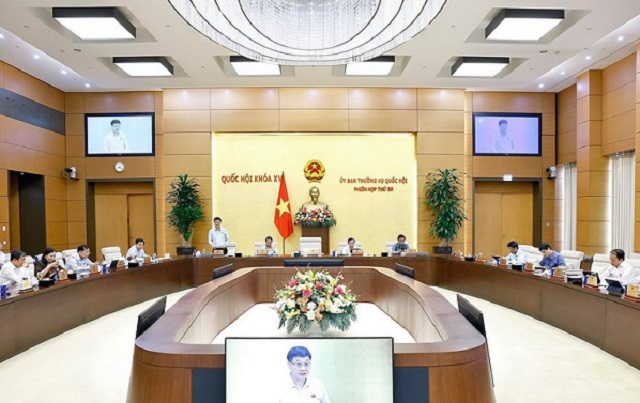
On October 17, 2025, the Standing Committee of the National Assembly reviewed the amended Investment Law and related resolutions. (Photo: Doãn Tấn/TTXVN)
|
On the morning of October 17, during the 50th session, the Standing Committee of the National Assembly discussed the amended Investment Law.
Vice Chairman of the National Assembly Vũ Hồng Thanh chaired the discussion.
Presenting the proposal, Deputy Minister of Finance Nguyễn Thị Bích Ngọc stated that the draft law comprises 7 chapters, 60 articles, and 4 appendices. It amends 33 out of 77 articles and 1 appendix, removes 17 articles, retains 25 articles and 3 appendices, and adds 2 new articles, while reorganizing the clauses.
The core principle is a significant shift from ex-ante to ex-post checks, coupled with enhanced inspection and supervision, and the simplification of administrative procedures in investment and business.
The key amendments focus on narrowing the scope of projects requiring investment approval procedures.
These procedures now apply only to critical and sensitive infrastructure projects (such as seaports, airports, telecommunications, and media), projects proposing the use of coastal land, and large-scale projects impacting national defense, security, and the environment.
The draft law eliminates investment approval procedures for projects that have undergone bidding or transparent investor selection processes. It also expands the authority of the Prime Minister and provincial People’s Committee Chairpersons to approve projects previously under the National Assembly’s jurisdiction (except in special cases requiring consultation with the Standing Committee of the National Assembly).
Additionally, the draft removes unnecessary appraisal content, such as technology and environmental assessments, clarifies planning compliance criteria to reduce processing time, and eases administrative burdens.
The draft law introduces a ban on investment in electronic cigarettes and heated tobacco products to protect public health.
It also removes 21 conditional business investment sectors no longer deemed necessary (e.g., accounting services and tax procedures).
Regarding overseas investment, the draft eliminates approval procedures for outbound investments and narrows the scope of projects requiring overseas investment registration certificates (only applicable to projects with capital of 20 billion VND or more, or those in conditional business sectors).
Furthermore, the draft allows the establishment of economic organizations without prior investment projects to enhance investment attractiveness. It expands the “green channel” mechanism for projects in industrial zones, economic zones, and high-tech parks, and includes provisions for asset transfers and extensions of operation periods for railway projects, as well as asset transfers to the state upon project completion.
The Government proposes that the law, if approved by the National Assembly, take effect from January 1, 2026, to promptly address investment and business bottlenecks.
In the review report of the amended Investment Law, Chairman of the National Assembly’s Economic and Financial Committee Phan Văn Mãi supported the need to improve the legal framework for investment.
However, the committee recommended thorough reviews of critical aspects, such as providing a detailed explanation of the feasibility and risks of removing the National Assembly’s authority to approve investment policies. It also suggested reporting to competent authorities and seeking input from specialized National Assembly committees on amendments to the Railway Law regarding asset transfers for railway projects upon completion. The committee urged further review and substantial reduction of business conditions, retaining only those essential for constitutional reasons (national defense, security, order, morality, and public health).
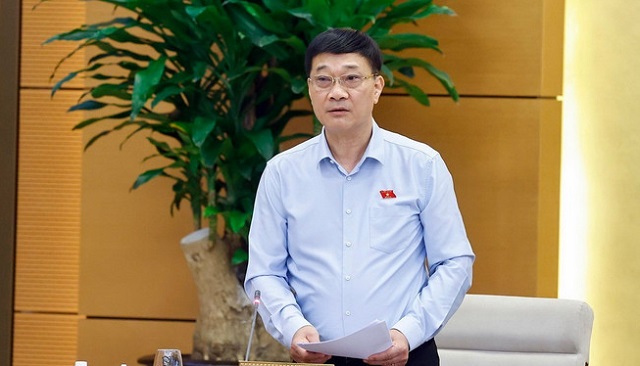
Vice Chairman of the National Assembly Vũ Hồng Thanh speaks. (Photo: Doãn Tấn/TTXVN)
|
The Economic and Financial Committee also emphasized caution and clarity in managing foreign investors establishing enterprises before receiving investment certificates, ensuring alignment with Resolution No. 50-NQ/TW of the Politburo on enhancing foreign investment quality and efficiency by 2030, which stresses selective foreign investment attraction.
During the discussion on the amended Investment Law, members of the Standing Committee of the National Assembly highlighted the law’s broad scope and its impact on the investment and business environment and economic reform.
Members provided input on the concept, scope, and authority for investment policy approval; criteria for determining conditional business sectors; institutionalizing Politburo Resolution 50 on improving FDI quality; ex-post mechanisms for foreign investors establishing economic organizations before having investment projects; and measures to prevent asset transfers or tax evasion.
Concluding the discussion, Vice Chairman Vũ Hồng Thanh emphasized that to ensure the law’s quality for National Assembly submission, the Standing Committee urged the Government to direct relevant ministries to refine the draft based on three principles:
Removing bottlenecks, creating a stable and synchronized legal framework aligned with development needs, and avoiding new complications; enhancing decentralization and empowerment, shifting from management to development facilitation, and maximizing the reduction of investment and business procedures and conditions; ensuring constitutionality, consistency with related laws (Land, Construction, Housing, Real Estate Business, Environment, Technology Transfer), and compliance with international commitments (foreign investment, outbound investment).
During the morning session, the Standing Committee also reviewed and decided on: allocating the 2025 central budget investment plan for projects using additional central budget revenue from 2022 and 2023 with completed investment procedures; and adjusting and consolidating the 2025 central budget investment plan for merged localities./.
Việt Đức
– 10:42 17/10/2025
Upcoming National Assembly Elections: Key State Leadership Appointments and Dismissals on the Horizon
During the first week of the 10th Session, the National Assembly will conduct elections, approve appointments, and relieve several key leadership positions within the state apparatus.
10th Session of the 15th National Assembly to Officially Commence on October 20th
Unveiling on October 20th, the 10th session of the 15th National Assembly is poised to be the most substantial of its term. With a staggering 49 legislative bills, 4 legislative resolutions, and 13 critical socio-economic, budgetary, and oversight agendas on the table, this session promises to be a pivotal moment in shaping the nation’s future.
Soaring High with VJC: Unlocking the Skies (Part 1)
Vietjet Aviation Joint Stock Company (HOSE: VJC) has solidified its position as a leading player in Vietnam’s aviation industry, boasting remarkable growth rates, a substantial market share, and a well-defined international expansion strategy. This impressive performance has garnered significant attention from investors in the market.
Vietnam’s Income Gap: 27 Years to Surpass the Philippines, How Long Until Cambodia?
In 1993, Vietnam’s per capita income stood at approximately $170, ranking it 10th out of 11 countries in Southeast Asia.
Vietnam’s Hidden Treasure: A Central Province Holds 80% of a Global Coveted Resource Beyond Rare Earths
Vietnam harbors a treasure that the world covets—a vibrant tapestry of culture, breathtaking landscapes, and unparalleled hospitality. From the lush terraces of Sa Pa to the ancient charm of Hoi An, and the bustling energy of Hanoi, every corner tells a story worth exploring. Its cuisine, a symphony of flavors, captivates palates globally, while its resilient spirit inspires admiration. Vietnam isn’t just a destination; it’s an experience that leaves an indelible mark on all who encounter it.


